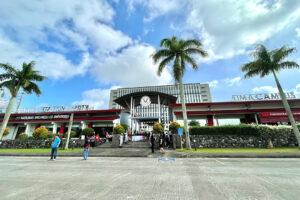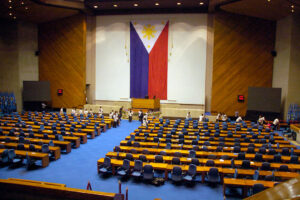October is National Shelter Month in the Philippines, a celebration to promote dignified, safe, and affordable housing for Filipino families. Led by the Department of Human Settlements and Urban Development (DHSUD), this year’s theme is “Build Homes, Build Happiness,” aiming to unite government agencies, private developers, and other stakeholders in the mission of providing Filipinos with one of the most fundamental of human rights: the right to adequate shelter.
“A home is where children feel safe to dream, where parents find strength, and where families draw comfort during difficult times. More than shelters, it is about building dignified lives,” DHSUD Secretary Jose Ramon Aliling said in a statement.
“In line with President [Ferdinand] Marcos, Jr.’s directive, we will intensify the promotion of a dignified life for our fellow Filipinos through decent housing and fast, transparent public service,” he said in Filipino.
Every October, the DHSUD and its key shelter agencies mount a month-long series of events across the country to advance the national housing agenda. Regional offices lead housing summits, community caravans, training programs, and project site visits designed to foster collaboration among stakeholders and open more pathways for Filipinos to obtain safe, affordable, and resilient homes.
First declared through Proclamation No. 662 in 1995, National Shelter Month underscores housing as both a foundation of nation-building and a collective duty, one that necessitates the cooperation of the government, private developers, and communities in the pursuit of inclusive human settlements.
THE ROLE OF THE PUBLIC SECTOR
As of 2023, according to the UN-Habitat Philippines, there is a backlog of 6.5 million housing units in the country, with an estimated 3.7 million informal settler families directly impacted by this deficit. Compounding the problem are the increasing rate of urban migration due to a host of factors displacing Filipinos from their homes, such as armed conflict, systemic inequity, and climate change.
Furthermore, the backlog is bottlenecked by declining housing production as result of slow bureaucratic, regulatory and approving procedures, a high reliance on private sector investment, and inadequate budget allocation for housing. It is highly likely this gap has widened since 2023.
The DHSUD has been established for this very purpose, as it serves as the Philippines’ lead agency for housing, human settlements, and urban development. Established on Feb. 14, 2019 through Republic Act No. 11201, it unifies housing policy, regulation, and planning under one institution. The law consolidated the functions of the former Housing and Land Use Regulatory Board and the Housing and Urban Development Coordinating Council, while transferring adjudication duties to the Human Settlements Adjudication Commission (HSAC).
As the government’s central policy-making and regulatory body for shelter and urban development, the DHSUD’s mission is to ensure that every Filipino has access to affordable, safe, and livable communities. It oversees four key shelter agencies: the National Housing Authority (NHA), which leads public housing production; the Pag-IBIG Fund, which mobilizes national savings and provides low-cost housing finance; the Social Housing Finance Corp. (SHFC), which implements socialized housing programs for low-income and informal settler families; and the National Home Mortgage Finance Corp. (NHMFC), which sustains affordable housing loans through a secondary mortgage market.
Each key shelter agency plays a role in the overall mission. For instance, the NHA this year made huge strides in furthering the administration’s flagship housing initiative, the Expanded Pambansang Pabahay Para sa Pilipino (4PH) Program. Last May, President Marcos signed into law a new measure expanding and strengthening the mandates of the NHA, and extending the agency’s corporate life by another 25 years effective July 31.
Among the important provisions of the new law is the inclusion of two expert parallel members with expertise in housing, urban planning, and development in the agency’s board to allow more active private sector contributions to the development of a more inclusive government housing program. Also included are provisions for three assistant general managers to enable more efficient management and operations within the agency’s day-to-day affairs, compared to only one in the old charter.
Meanwhile, agencies like the SHFC and NHMFC are working on ways to make housing more accessible. A recent example is a moratorium on amortization payments for borrowers affected by natural disasters such as Tropical Storm “Crising” and the southwest monsoon last July.
This temporary payment relief allows families to focus on recovery without the immediate pressure of monthly dues. It forms part of a broader government effort, alongside the DHSUD, NHA, and Pag-IBIG Fund, to provide financial breathing room and preserve homeownership stability for disaster-stricken communities.
For this year’s National Shelter Month, Secretary Aliling highlighted two key milestones that mark significant progress in tackling the country’s housing challenges. The first is a newly approved memorandum of agreement with the University of the Philippines (UP) to launch a pilot rental housing project for informal settler families within the UP Diliman campus — a pioneering initiative that aims to provide secure, affordable shelter in urban areas. The Home Development Mutual Fund, more known as Pag-IBIG Fund, have expressed support for this initiative as well.
“This is just the beginning,” Mr. Aliling said. “More rental housing projects will be rolled out in line with President Marcos, Jr.’s directive to ensure dignified living for all Filipinos.”
The second milestone is the forthcoming distribution of certificates of award to families who have lived for decades on lands covered by Presidential proclamations. This long-awaited step, he added, will finally grant thousands of long-term occupants the security of tenure and peace of mind they have sought for generations.
“When we build homes, we strengthen our nation. When we build happiness, we fulfill the highest purpose of public service, uplifting lives and giving every Filipino family the future they deserve,” Mr. Aliling said.
“Every home we build is a story of hope, and every family we serve is a testament to why public service matters. Together, we can make Bagong Pilipinas a reality — one home, one community, one future at a time,” he had said. — Bjorn Biel M. Beltran






